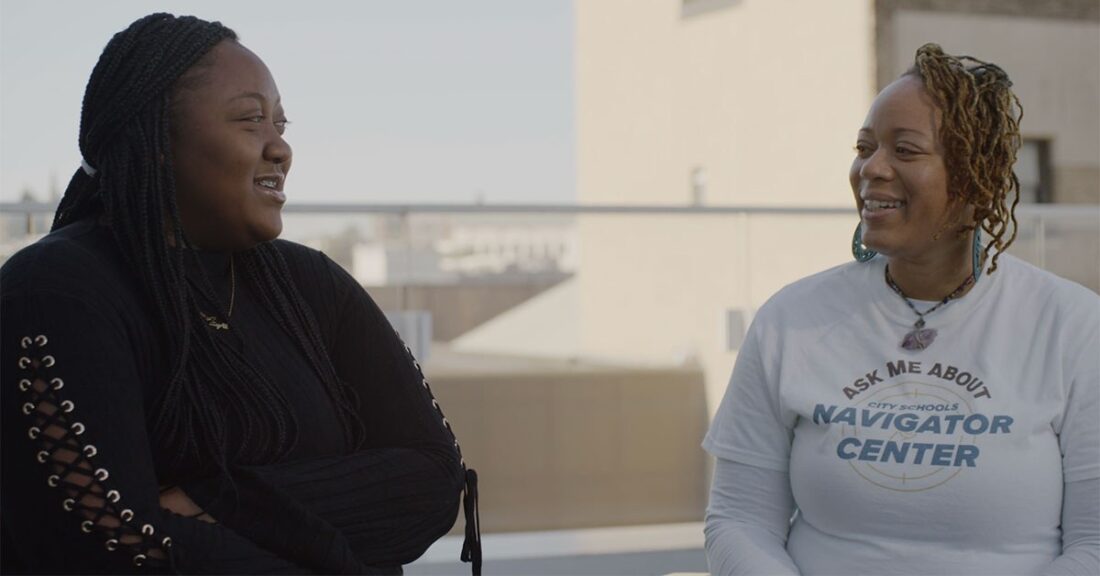How Baltimore Is Helping Students Transition From High School

Baltimore City is home to 155 schools, including 45 high schools. In 2020, roughly 4,000 students graduated. However, many of these young people, despite their talents and aspirations, face barriers that prevent them from pursuing postsecondary education or securing stable employment. These youth also lose access to support and resources from Baltimore City Public Schools once they leave high school behind.
The Navigator Center
Here’s where the City Schools Navigator Center comes in. Launched as a pilot program in 2020 — with funding and support from the Annie E. Casey Foundation — the effort helps 18–24-year-old city residents apply to college or begin a new career through workforce development programs. The Center is the first of its kind in Baltimore and provides guidance specifically for those who graduate from high school and seek additional career support in the early years of young adulthood.
In the summer of 2021, more than 500 young people used the Center’s career counseling services at their in-person location within Forest Park High School. Hundreds of others accessed the Center’s website to search for financial aid, university housing and career training, or to submit a college application and request academic transcripts. By offering services online and in-person, the Navigator Center works with students wherever they feel most comfortable — a critical feature given the ongoing COVID-19 pandemic.
Supporting Graduates and Older Youth
For former students interested in college, the Navigator Center helps combat “summer melt,” a phenomenon that occurs when students leave high school with college aspirations, but never show up in the fall as intended. According to the Navigator Center, 42% of Baltimore City public school graduates experience summer melt.
“It’s important to recognize that young people in Baltimore need support over an extended period of time, not just when they’re enrolled in school,” says Sara Cooper, a senior associate with Casey’s Baltimore Civic Site. “The Navigator Center allows city schools’ ‘doors’ to remain open and accessible for graduates and even young people who may have left school without graduating.”
Through the Navigator Center, former students interested in continuing their education are connected with representatives at colleges. “They’re assigned a coach, such as a current student or staff member, who supports them along their journey and tracks their progress to make sure they’re moving forward,” says Towan Cooper, who manages the Navigator Center. “Having that kind of support from someone within higher education makes a huge difference.”
A Focus on Connecting Young People with Work
The Center also was intended to support young people who are not interested in attending college after high school, with many former students interested in learning a trade or beginning their careers right after high school.
“Not everybody is college-bound and we have to think about the student who isn’t choosing college as their next step,” says Cooper. “Today, we’re seeing more and more students who start careers right out of high school. For many students who aren’t sure which path to take, the Center provides important guidance that young people traditionally lose access to after high school.”
The Navigator Center offers young people one-on-one guidance from coaches in a variety of disciplines, not only higher education. This includes representatives from local businesses, paralegals from the Baltimore State’s Attorney’s Office and career development specialists.
“When we began to look for volunteer coaches, we reached out to everyone we could think of that might be interested,” says Tracy Kyttle, a City Schools manager who specializes in postsecondary advising. “We were blown away by the number of caring adults from a variety of fields who wanted to help.” Each volunteer mentor agrees to undergo training and commit to a four-month rotation during which they cultivate relationships with their student mentees. “It was important that we think smarter, not harder, and lean into the relationships and the talents of our own city to build our internal capacity and success culture,” adds Kyttle.
Community Partnerships Are Key
The Center has forged an important partnership with Wide Angle Youth Media, a local nonprofit that works with young people to teach them how to tell their own stories through video, photography and social media. With the support and guidance of both organizations, two former students developed a full media campaign promoting the Navigator Center that included ads placed on MTA vehicles, targeted text messages and even a video commercial. “We saw this as an important opportunity to not only give students direct career experience, but also to authentically center our own young voices in shaping our narrative,” says Kyttle.
Eventually, the Navigator Center hopes to expand its reach by establishing additional relationships with nearby colleges and local businesses. “The Navigator Center’s ultimate goal is to ensure our graduates are persisting in their postsecondary pursuits and finding success no matter which pathways they choose,” says Jacqueline Pendergrass, a City Schools manager. “We will do this through a holistic approach mobilizing community, resources and support that empower our young people to enjoy choice-filled lives.”
Learn More About Helping Young People Graduate and Find Careers





